You are here
New Releases
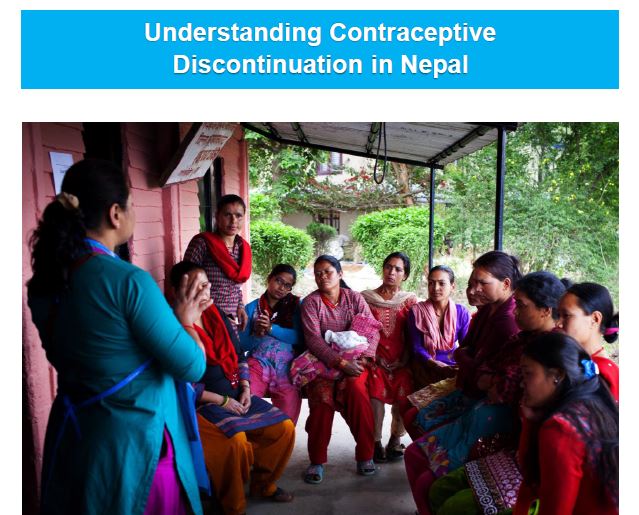
Understanding Contraceptive Discontinuation in Nepal
This prospective observational study was conducted with the aim of determining discontinuation rates of short-acting reversible contraception and short-acting reversible contraception and the factors associated with method discontinuation. The study also aims to assess contraceptive behavior following discontinuation.
Harmful Practices in Nepal : Report on Community Perceptions
Harmful practices can be defined as persistent behaviours that discriminate on the basis of sex, gender, age, caste/ethnicity, language, religion, amongst others. They leave women and people from excluded groups at risk of violence, poorer physical and psychological health, limited educational and economic outcomes, injuries, and even death. Notably, harmful practices are not isolated or random. They stem from deeply-rooted patriarchal, social, cultural and religious norms perpetuated throughout centuries that view women, as well as lower caste groups, as inferior.
Literature Review on Harmful Practices in Nepal
Every year, people across Nepal are subjected to violence, poor health outcomes, and death as a result of harmful practices. These practices stem from deeply embedded patriarchal norms and unequal power relations and are a significant barrier to the realization of human rights and equality in development outcomes, particularly for women and persons from excluded groups. Despite significant advancements in legislative and policy frameworks, harmful practices continue to pervade in Nepal.
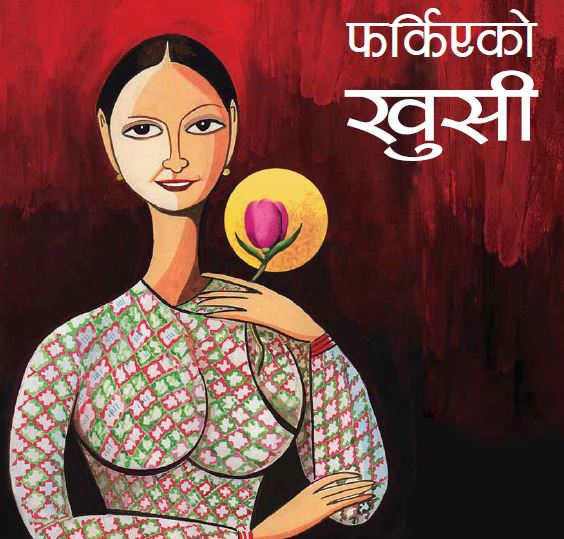
फर्किएको खुशी
स्वीस सरकार विकास सहयोग (एसडीसी) र संयुक्त राष्ट्रसंघीय जनसंख्या कोष (यूएनएफपिए) को सहयोगमा लागू गरिएको पहिलो चरणको लैङ्गिक हिंसा निवारण परियोजना अन्तर्गत प्रकाशित यो पुस्तक सफल कथाहरुको संग्रह हो । यस पुस्तकमा सिन्धुली, ओखलढुंगा र उदयपुरका उदाहरणीय सफलताका कथा समेटिएका छन् । विभिन्न खाले हिंसामा परेर पुनर्स्थापना भएका तथा स्थानीय तहका जनप्रतिनिधिले लैङ्गिक असमानता हटाउन गरेको सक्रिय भूमिका यसमा समेटिएको छ ।
Demographic Profile of Province 2
सङ्घीय लोकतान्त्रिक गणतान्त्रिक नेपालको सातवटा प्रदेशहरु मध्ये प्रदेश नं. २ सामाजिक, सांस्कृतिक, भौगोलिक, आर्थिक, जनसाङ्ख्यिक लगायतका दृष्टिकोणले विशिष्ट विशेषतायुक्त रहेको छ । यही तथ्यलाई प्रदेशको नीति तथा योजना आयोगले समग्र रुपान्तरणको मार्ग चित्र कोर्न नवीनतम् कार्यहरुको सुरुआत गरेको छ । आर्थिक समृद्धि हासिल गर्दै यहाँका जनताको समग्र जीवनस्तरमा कायापलट ल्याउने मार्गमा अग्रसरता प्रारम्भ गरेको छ । हरेक क्षेत्रका विकासका नयाँ नयाँ आधार सिर्जना गर्ने कार्य अगाडि वढिरहेको छ । यसैको एक पाइला प्रदेश नं. २ को जनसाङ्ख्यिक स्थितिको प्रकाशन हो ।
विकासका सम्पूर्ण क्रियाकलापको केन्द्रीयतामा जनसङ्ख्या नै रहेको हुन्छ । विकासका नीति योजना तयार गर्दा प्रदेशको जनसाङ्ख्यिक स्थिति, जनसङ्ख्या परिवर्तनका तत्व, जनसङ्ख्यासँग सम्वद्ध शिक्षा, स्वास्थ्य लगायत विविध सामाजिक पक्षहरु अति आवश्यक हुन्छन् । साथै प्रदेशको आर्थिक क्रियाकलापमा जनसङ्ख्याको सहभागिता तथा युवा जनसङ्ख्याको स्थिति लगायतका पक्षहरुले पनि त्यतिकै महत्व राख्छन् । यी महत्वपूर्ण तथ्य सहितको यथार्थ चित्रले मात्र प्रदेश तहमा योजना निर्माण तथा कार्यान्वयनमा सहजता प्रदान गर्छ । यी उद्देश्य राखि पहिलो पटक प्रदेश नं. २ को जनसाङ्ख्यिक स्थिति तयार पारिएको हो ।
This Demographic Profile of Province 2, prepared by of the Policy and Planning Commission with UNFPA's support, analyzes the existing demographic situation, including dimensions such as fertility, mortality and migration (relating to population growth) and population structures along with the projection of population for the provincial and palika level. This docoument is expected to help formulate effective policies, plans and programmes for sustainable development of Province 2.
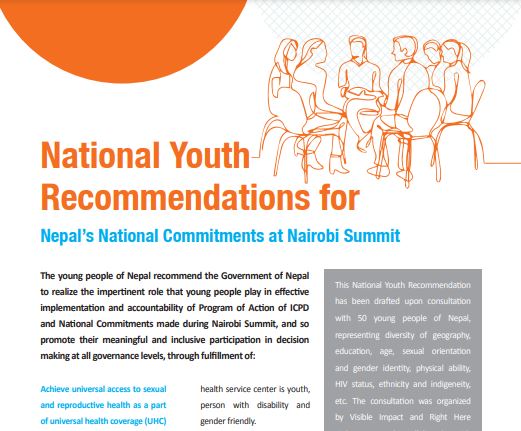
National Youth Recommendations for Nepal’s National Commitments at Nairobi Summit
This National Youth Recommendation was drafted upon consultation with 50 young people of Nepal, representing diversity of geography, education, age, sexual orientation and gender identity, physical ability, HIV status, ethnicity and indigeneity, etc. The consultation was organised by Visible Impact and Right Here Right Now Nepal in collaboration with YPeer Nepal, Beyond Beijing Committee and UNFPA Nepal on September 4, 2019.
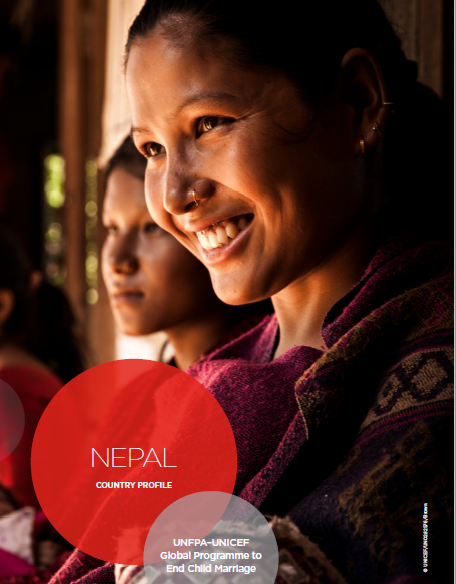
Nepal child marriage profile
Nepal has the third highest rate of child marriage in Asia. Despite laws against it, the practice remains widespread in the country. Child marriage threatens the lives and health of girls, and limits their future prospects. Girls pressured into child marriage often become pregnant while still adolescents and are at higher risk of complications during pregnancy and childbirth.
UNFPA is working closely with all its partners in Nepal towards a society that is free of violence and harmful practices for all women and girls, including child marriage. Under the Global Programme to End Child Marriage, jointly implemented by UNFPA and UNICEF with local partners in Nepal, both agencies have made concrete efforts to promote policies and programmes designed to end child marriage. Together we have accelerated action towards the empowerment, participation and protection of girls through interventions that are complementary and based on the added value we bring to this partnership.
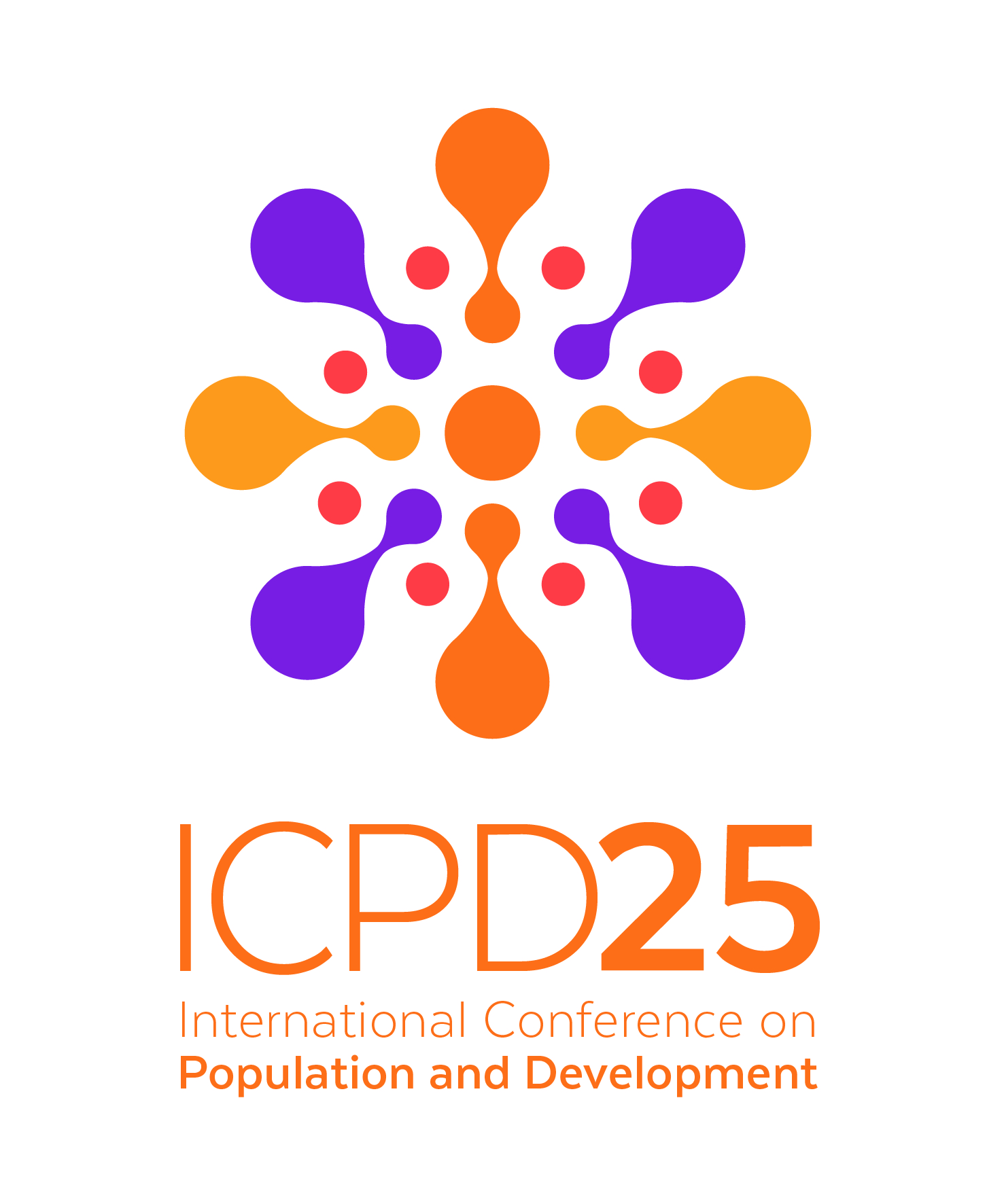
25 Years of the ICPD: Accelerating the Promise
The year 2019 marks the 25th anniversary of the International Conference on Population and Development (ICPD), held in Cairo in 1994. At the conference, 179 governments including Nepal adopted a visionary Programme of Action that called for women’s reproductive health and rights to take centre stage in national and global development efforts.
Since 1994, remarkable progress has been made in Nepal, but there are many women and girls who have not benefited from the promise of ICPD. These documents (in English and Nepali) highlight what's changed in Nepal since ICPD and the unfinished business as well as to give a momentum to the Nairobi Summit on ICPD25 in Kenya on 12-14 November that the Governments of Kenya and Denmark and UNFPA are co-convening.
The goal of this upcoming summit is to elicit commitments to end preventable maternal deaths, eliminate unmet need for modern contraceptive methods, and end gender-based violence and harmful practices against women and girls – as an indispensable part of Agenda 2030.
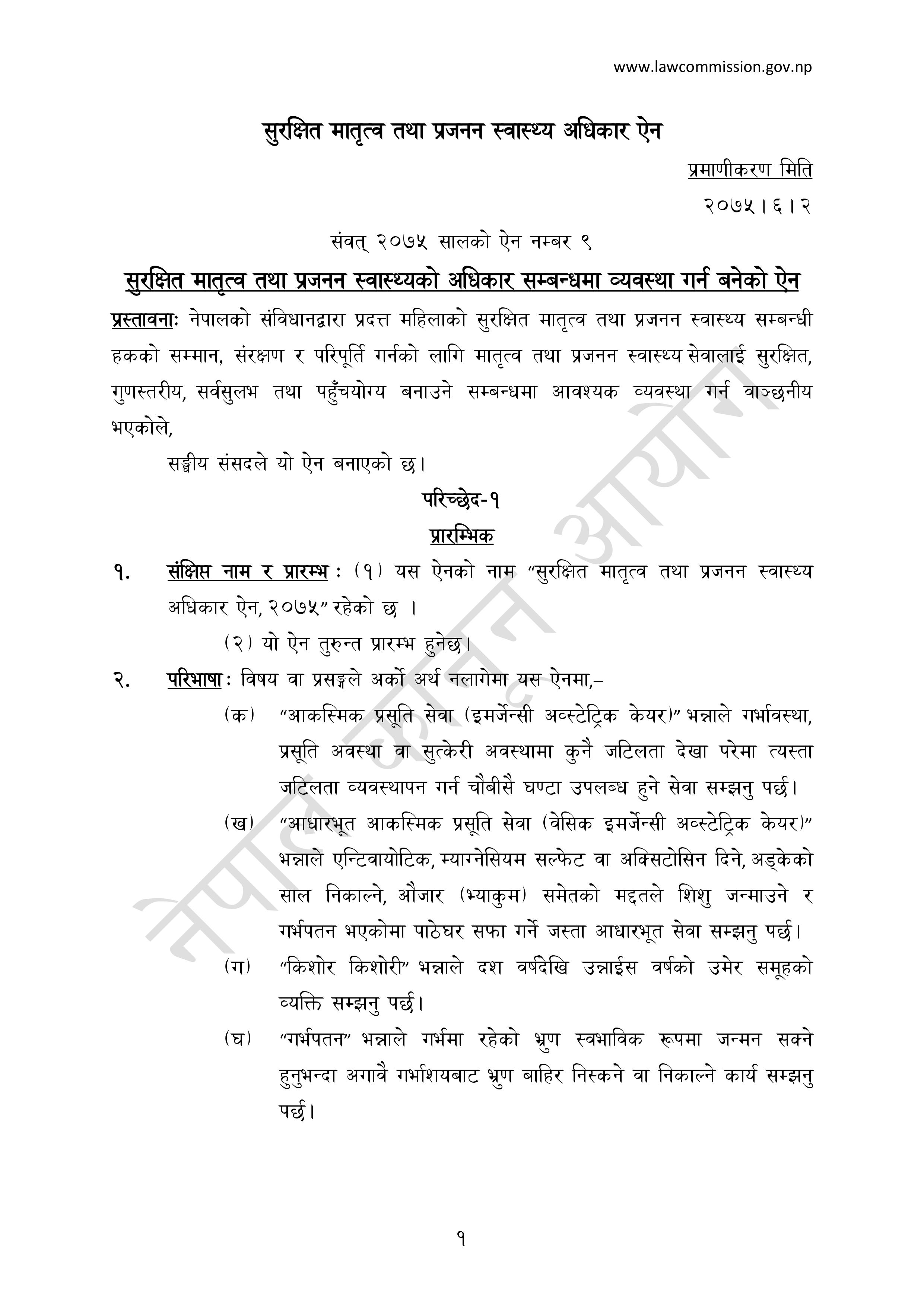
Right to Safe Motherhood and Reproductive Health Act 2075
नेपालको संविधानद्धारा प्रदत्त महिलाको सुरक्षित मातृत्व तथा प्रजनन स्वास्थ्य सम्बन्धी हकको सम्मान संरक्षण र परिपूर्ति गर्नको लागि मातृत्व तथा प्रजनन स्वास्थ्य सेवालाई सुरक्षित, गणस्तरीय, सर्वसुलभ र पहुँच योग्य बनाउने सम्बन्धमा आवश्यक व्यवस्था गर्न वाञ्छनीय भएकोले सङ्घीय संसदले यो ऐन बनाएको हो ।
The Right to Safe Motherhood and Reproductive Health Act 2075, enacted by the Federal Parliament of Nepal, ensures necessary provisions on making motherhood and reproductive health service safe, qualitative, easily available and accessible , in order to respect, protect and fulfill the right to safe motherhood and reproductive health of the women conferred by the Constitution of Nepal.
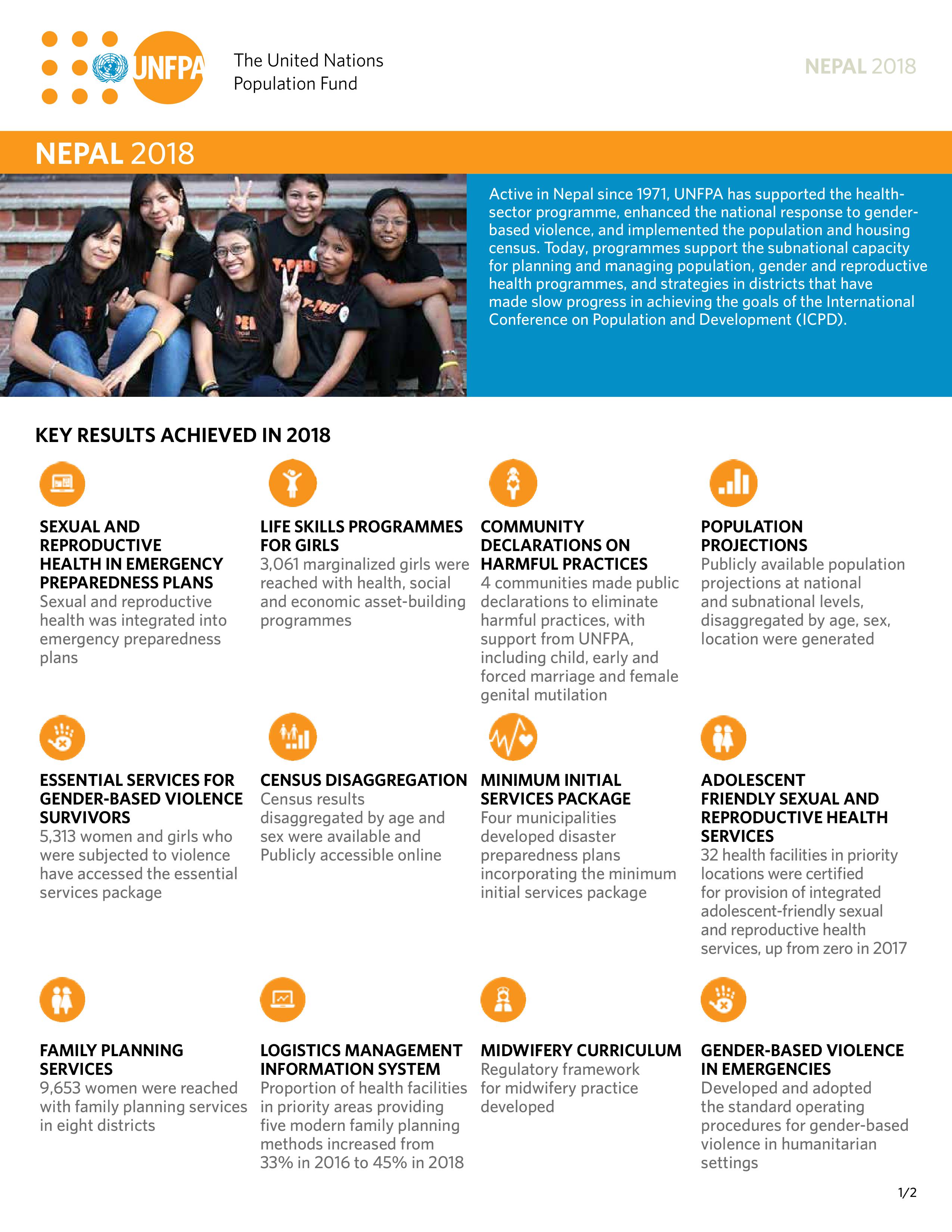
UNFPA Annual Report 2018
Active in Nepal since 1971, UNFPA has supported the health-sector programme, enhanced the national response to gender-based violence, and implemented the population and housing census. Today, programmes support the subnational capacity for planning and managing population, gender and reproductive health programmes, and strategies in districts that have made slow progress in achieving the goals of the International Conference on Population and Development (ICPD).